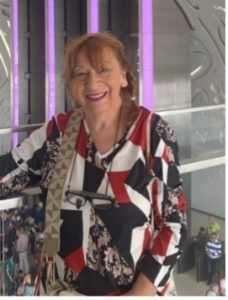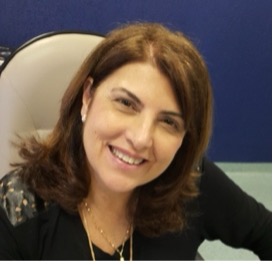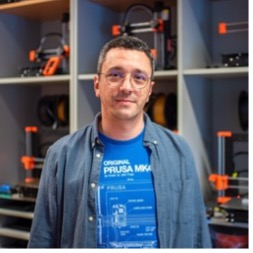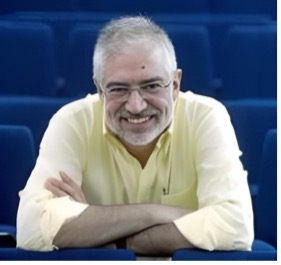|
|
Ana Breda University of Aveiro, Portugal GeoGebra: A Successful Collaboration in My Academic Career Throughout my career as a university lecturer, GeoGebra has progressively become an indispensable tool, both in my teaching practice and in the research I have carried out—and continue to pursue—in mathematics and mathematics education. GeoGebra, by enabling the dynamic construction and exploration of mathematical concepts, serves as a facilitator for understanding and anticipating certain properties. It plays a decisive role in the promotion and formulation of conjectures. While it is true that some of these conjectures can be quickly validated or refuted mathematically, others turn into genuine puzzles, requiring deeper exploration and a broader mathematical knowledge base—thus opening paths for research in various areas. In this presentation, I will share with you some significant episodes in which GeoGebra has played a central and decisive role in my journey as a teacher and researcher. Ana Breda, a mathematician and Associate Professor with habilitation at the University of Aveiro, Portugal, obtained her PhD in Geometry and Topology in 1989. She teaches mathematics courses aimed at future educators and mathematics teachers, and her research interests focus on the computational, geometric, and algebraic aspects of surface intersections, integrating dynamic geometry software functionalities. She also maintains a strong commitment to mathematics education. Ana Breda is a member of the Portuguese committee of the International Commission on Mathematical Instruction (ICMI) and coordinates the GEOMETRIX Thematic Line at the Centre for Research and Development in Mathematics and Applications (CIDMA). |
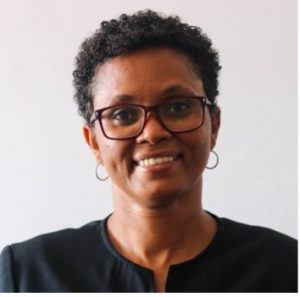 |
Astrigilda Pires Rocha Silveira
University of Cabo Verde GeoGebra and STEAM: Driving Teacher Training and Curriculum Innovation in Portuguese-Speaking African Contexts The integration of digital technologies into mathematics education has emerged as a crucial strategy to enhance the quality of education and prepare students for the challenges of the 21st century. In this context, this presentation explores the impact of teacher training in GeoGebra, conducted in Cabo Verde and Mozambique, on the promotion of innovative pedagogical practices and on professional teacher development. Anchored in the STEAM approach (Science, Technology, Engineering, Arts, and Mathematics), the initiative aims to strengthen teachers’ competencies in the use of digital tools to create more dynamic and contextualised learning environments. In both Cabo Verde and Mozambique, the certification of teachers as GeoGebra trainers demonstrates a direct impact on teacher qualification and the production of scientific knowledge. In Cabo Verde, the training had a direct influence on the development of several undergraduate dissertations and master’s theses that used GeoGebra as a research tool. Furthermore, it contributed to a comprehensive curricular reform, introducing GeoGebra into new programmes, school textbooks, and teaching resources aligned with contemporary demands. Despite these advances, a lack of commitment from some teachers was observed during the training process, highlighting the need for public policies that promote the sustainability of innovative practices. In this regard, the 2025 Career, Roles and Remuneration Plan (PCFR) in Cabo Verde offers a strategic framework for integrating GeoGebra training and the STEAM approach into teacher career progression, fostering the enrichment of teaching resources, pedagogical differentiation, and innovation in teaching and learning. Additionally, the government is developing a “National Integrated System for Initial and Continuing Teacher Training,” currently under regulatory development, which may benefit from the expertise of the GeoGebra Institute at the University of Cabo Verde (Uni-CV). The findings suggest that continuous training in digital technologies, combined with the STEAM approach, is essential to address today’s educational challenges and prepare students for future contexts. GeoGebra and the STEAM approach may serve as effective strategies to support governments in implementing curriculum reforms and improving educational quality in Portuguese-speaking African contexts. Astrigilda Pires Rocha Silveira holds a degree in Mathematics – Teaching Stream from PUCRS, Brazil, a Master’s and a PhD in Multimedia in Education from the University of Aveiro, Portugal, and a Postdoctoral qualification in Mathematics Education from the Research and Innovation in Education Centre at the Polytechnic Institute of Porto, Portugal. She is a tenured professor at the Public University of Cabo Verde, with 25 years of experience in higher education. She served as Vice-Rector of Uni-CV from 20/04/2016 to 20/05/2020. She has been a consultant for the GeoGebra Teacher Training Project in Mozambique and Angola. Since 2017, she has been the Director of the GeoGebra Institute at Uni-CV and conducts research in the fields of Mathematics Education and STEAM Education, with a special focus on initial and continuing teacher training. |
|
|
Claúdia Lisete Oliveira Groenwald
Lutheran University of Brazil Mathematics Teachers’ Pedagogical Knowledge and the Importance of Technology Use in Mathematics Education The pedagogical knowledge of a Mathematics teacher goes beyond mastery of mathematical content; it also involves understanding how to teach it, integrating didactic and technological resources into pedagogical planning. In this context, the use of digital technologies in Mathematics Education enhances innovative ways of teaching and learning. This conference will discuss the use of learning objects developed with GeoGebra software, organized into investigative didactic sequences that foster the development of mathematical thinking. Claudia Lisete Oliveira Groenwald holds a degree in Mathematics, is a specialist in Mathematics Education, has a PhD in Educational Sciences from the Pontifical University of Salamanca in Spain, and completed a postdoctoral programme at the University of La Laguna in Tenerife, Spain. She works at the Lutheran University of Brazil (ULBRA) and the Franciscan University (UFN), both located in the state of Rio Grande do Sul, Brazil. She is involved in the Postgraduate Programme in Science and Mathematics Teaching. Her research interests include curriculum in Mathematics Education, teaching and learning in Mathematics Education, and the use of technologies in Mathematics Education. |
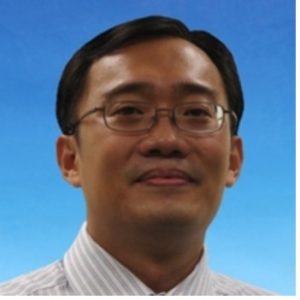 |
Ho Weng Kin
Nanyang Technological University, National Institute of Education, Singapore GeoGebra and the Out-Triangle Centroid Theorem: A Student’s Case Study in Mathematical Discovery
This talk presents a unique case study centered on a student-led mathematical investigation in Euclidean geometry, empowered by the dynamic capabilities of GeoGebra. The investigation focuses on identifying the largest out-triangle that can be constructed from a given triangle and culminates in the formulation of theOut-Triangle Centroid Theorem. Through this journey of conjecturing, constructing, testing, and proving, the student exemplifies the power of technology-enhanced inquiry in mathematics education. The talk reflects on key moments of exploration, the pedagogical role of teacher facilitation, and the affordances of GeoGebra in enabling visualization and reasoning. It ends with a discussion on broader implications for fostering student agency in mathematical investigations. Dr Weng Kin Ho is an Associate Professor at the National Institute of Education, Nanyang Technological University, Singapore. He specializes in mathematics, theoretical computer science, and mathematics education, with a research focus on domain theory, computational thinking, and technology-enhanced learning. A passionate advocate for inquiry-based pedagogy, he has led numerous projects on integrating GeoGebra and coding into mathematics classrooms. He serves as the current President of the Association of Mathematics Educators in Singapore and is a long-standing contributor to the international mathematics education community. |
|
|
Mathias Tejera Technological University, Uruguay / Johannes Kepler University, Austria GeoGebra, Mathematical Modelling and 3D Printing: New Possibilities for the Mathematics Classroom Emerging technologies are redefining the mathematics classroom by offering new pedagogical and methodological opportunities. Tools such as GeoGebra and 3D printing are becoming key resources that support the integration of mathematical modelling in educational contexts (Ng et al., 2017; Graham et al., 2021). This talk aims to share concrete experiences on how to effectively incorporate these resources into mathematics lessons. Mathematical modelling enables students to engage with authentic problems by simplifying complex situations (Blum & Borromeo, 2009) and exploring mathematical relationships through dynamic visual representations generated with GeoGebra (Tejera, 2021). 3D printing complements this process by materialising mathematical models, producing tangible objects that help students grasp abstract concepts (Witzke & Hoffart, 2016; El Bedewy et al., 2021a). During the session, specific educational examples will be discussed, in which students carry out geometric modelling tasks in architectural design contexts and other real-world scenarios, illustrating how these processes significantly enhance mathematical understanding (Tejera et al., 2022; El Bedewy et al., 2022). Furthermore, from a research-based perspective, two relevant theoretical frameworks will be briefly introduced: the mathematical modelling cycle proposed by Blum and Leiß (2007) and Rabardel’s (2002) instrumental genesis theory, which underpin the pedagogical and methodological decisions taken. The talk will also address the deliberate selection of GeoGebra as a technological tool for mathematical modelling and 3D printing in educational settings, highlighting its ability to dynamically integrate multiple mathematical representations and support both instrumentation and instrumentalisation in the process of mathematical learning (Villa & Ruíz, 2010; Rabardel, 2002). Finally, we will reflect on the pedagogical challenges and opportunities presented by these emerging technologies, emphasising the importance of integrating them into both initial and continuing teacher education, in order to promote a more meaningful, engaging, and reality-connected mathematics teaching approach (Ford & Minshall, 2019; Günster & Weigand, 2020). Mathias Tejera is a university assistant in the Department of STEM Education at Johannes Kepler University Linz, Austria, where he is involved in both research and teaching. He also serves as the lecturer in charge of Educational Technology at the Technological University (UTEC) in Uruguay. He is currently completing his PhD at Johannes Kepler University. |
|
|
Pedro Quaresma University of Coimbra, Portugal Inductive and Deductive Reasoning in GeoGebra Given its formal, logical, and spatial properties, geometry enables the development of integrated systems in which both inductive and deductive approaches can be explored. The development of automated geometry theorem proving systems and dynamic geometry systems began as separate initiatives, but their integration into unified systems is currently underway. Pedro Quaresma obtained his PhD in Computer Science, specialising in the Foundations of Computer Science, from the University of Minho in 1998, and is currently an Assistant Professor in the Department of Mathematics at the University of Coimbra. He has authored over 83 peer-reviewed publications, including 18 papers in indexed journals (ISI and/or Scopus), 12 papers in Lecture Notes in Artificial Intelligence (LNAI), and 18 publications as volume editor for LNAI and Electronic Proceedings in Theoretical Computer Science (EPTCS). He is a member of the Centre for Informatics and Systems of the University of Coimbra (CISUC). His research areas include automated deduction and knowledge management in geometry, as well as the application of ICT in education. |
|
|
Rafael Losada Liste GeoGebra Institute of Cantabria GeoGebra, the Mathematical Explorer Te encuentras en un lugar salvaje y desconocido. No estás vestido. Sientes sed, hambre y frío. Todo te resulta extraño. Estás desorientado y no sabes qué hacer, hacia dónde ir o cómo moverte. De repente, descubres un baúl. En su interior, encuentras ropa y calzado, agua y provisiones, un botiquín de primeros auxilios, una brújula, un mapa detallado y todo tipo de herramientas y utensilios para protegerte y abrirte camino. Tienes 15 años. Las matemáticas son un misterio para ti, algo que te causa miedo. Pero acabas de descubrir GeoGebra. En esta presentación, mostraré algunos ejemplos de cómo podemos aprovechar eficazmente estas herramientas para explorar sin miedo el universo de las Matemáticas. You find yourself in a wild and unfamiliar place. You are not dressed. You feel thirsty, hungry, and cold. Everything seems strange. You are disoriented and don’t know what to do, where to go, or how to move. Suddenly, you discover a chest. Inside, you find clothes and shoes, water and provisions, a first aid kit, a compass, a detailed map, and all sorts of tools and utensils to protect yourself and find your way. You are 15 years old. Mathematics is a mystery to you—something that causes fear. But you have just discovered GeoGebra. |
 |
Tommy Tanu Wijaya
School of Mathematical Sciences, Beijing Normal University, China. Key Factors for the Adoption of GeoGebra Among Primary Education Teachers in China Dynamic mathematics software such as GeoGebra has revolutionised the teaching of complex mathematical concepts, becoming a crucial tool for effective primary education. However, the integration of such technologies in primary schools across China is not yet widespread. This study seeks to address this gap by identifying the key factors influencing the adoption of GeoGebra among 266 primary school teachers in the provinces of Hunan and Guangdong. Our findings reveal that Facilitating Conditions—such as access to resources and institutional support—are the main drivers behind the use of GeoGebra. Additionally, Effort Expectancy significantly influences teachers’ willingness to integrate the tool into their pedagogical practices. The importance of these factors highlights a key conclusion: for successful technology adoption, infrastructural and administrative support is just as crucial as the technological features themselves. Based on these results, we recommend that educational leaders and policymakers focus on improving facilitating conditions by providing stronger support systems and training opportunities. This study contributes to the broader discourse on educational technology by highlighting specific institutional strategies that can help maximise the educational benefits of dynamic mathematics software in primary schools. Assistant Professor Tommy Tanu Wijaya, PhD, is a dedicated mathematics educator and researcher from Indonesia, currently serving as a Junior Researcher at the National Research Institute for Mathematics Teaching Materials in Beijing, China. He also holds the position of Head of Academic Affairs at the Maker Space of the Mathematics Programme at Guangxi Normal University, China. Tommy has been awarded a postdoctoral fellowship at Beijing Normal University, where he has also worked as a Visiting Professor at Universitas PGRI Kanjuruhan Malang, Indonesia. |
|
|
Representative of GeoGebra Team (TBA) GeoGebra: Present and Future Join a representative from the GeoGebra team on an inspiring journey through the present and future of GeoGebra! This talk will explore how GeoGebra has revolutionised the teaching of mathematics over the years and how it continues to evolve as a powerful tool for teaching and learning. |
